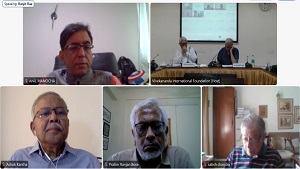On the 13th of June, 2022, The Vivekananda International Foundation organised a round table discussion on 'India's Economic Engagement within its Neighbourhood'. The session began with Dr Arvind Gupta's brief remarks on the nature and extent of India's economic relations with its neighbours. This was followed by a series of comments by Ambassador Ashok K Kantha, Ambassador Ranjit Rae, Ambassador Pinak Chakravarty, Mr Pratim Ranjan Bose, Mr Anil Manocha and Mr MJ Sheikh. Alongside analysing India's current avenues of economic engagement with its neighbours, the session also delved into prospects for improvement and further cooperation.
The discussion began by outlining that the key to India's regional economic engagement lay within the Neighbourhood First Policy. Since India is the largest country in South Asia in terms of geographic standing and economic clout, it must ensure that it is sensitive to the needs of its neighbouring countries- in a non-reciprocal and generous manner. In turn, India would be able to create an environment where the neighbourhood is economically bound to itself and, consequently, remains sensitive to its core security and economic issues. Secondly, India must establish a web of regional connectivity amongst its immediate neighbours and restore the traditional linkages in the South Asian peninsula. The South Asian region was once a common economic space, and India should attempt to re-work the old route by building new linkages by establishing railway lines, river navigation systems, maritime communications, digital connectivity and telecommunications networks. Finally, India must shed its past hesitations of working in a trilateral or regional format, activate SAARC, reinforce BIMSTEC and develop a more forthcoming approach towards engagements via similar modalities.
India can also be regarded as a visionary regarding its template for economic engagement in the neighbourhood. Its motto for development partnerships encompasses liberating the potential of recipient states without constraining their futures. This particularly manifests in the fact that India has invested heavily in lines of credit and never sanctions commercial loans. Moreover, beyond merely financial funds, India also engages in skill-sharing exercises in both the civil and military domains.
The discussion also dwelt on the importance of creating a common economic market in the neighbourhood- an interconnected, interdependent economic space where each country can fully exploit its competitive advantage. In Nepal and Bhutan, for instance, energy cooperation has played a significant role in facilitating this economic space. Establishing a robust and bustling regional energy grid between Nepal, Bhutan, and Bangladesh provides opportunities for India's bilateral trade and bilateral trade amongst the neighbours as well. Here, it is critical that India remain generous in allowing its neighbours to benefit from the infrastructure and pursue trade amongst themselves instead of insisting that all transactions pass through itself. While great strides have been made in this domain, there is still a paucity of regional economic cohesion. A majority of the problem stems from two avenues: poor implementation and sustainability of Indian projects in the neighbouring countries. Even though India has invested huge sums in the form of developmental projects in the neighbourhood, not all results fructify to their maximum extent. Oftentimes projects are implemented abroad as they are locally in India, which is not always the ideal case. Moreover, these projects also start deteriorating within short periods of their completion. To deal with such circumstances, India needs to establish evaluation units that monitor the progress of such projects and provide comprehensive recommendations on overcoming the shortfalls.
Additionally, India's economic partnerships must extend beyond merely government-to-government relations and into the private sector. In Nepal, for example, FDI from India has been at a consistent decline while China is on its way to becoming the country's largest FDI contributor. It is, therefore, in India and Nepal's best interests that their private sectors increase engagement and jointly examine the possible challenges to cooperation. Whether it be intellectual property rights, brand names, labour issues or problems pertaining to remittances- once identified, the issue areas can be worked upon and resolved. Moreover, instead of running border development programmes solely under the surveillance of the Indian Home Ministry, the Ministry of External Affairs and neighbouring state governments should be consulted as services and establishments along the borders tend to be mutually beneficial for both countries. While it would be ideal for the neighborhood to accommodate India's concerns, this would only be possible if a mutually beneficial and integrated economic space is developed- the remainder of the issues would gradually wane away on their own.
In terms of Sri Lanka, the discussants agreed that an economic crisis triggered a political crisis. Yet, while many countries turned a blind eye to Sri Lanka, India has been the first responder since 2022- providing lines of credit, currency swap agreements and additional support totalling a sum of 3.5 billion dollars. India has also rushed in large quantities of petroleum products, food, medicines and similar necessities, which have, by and large, enjoyed positive reception. One key challenge, however, is continuing to provide support to Sri Lanka without interfering with the country's domestic politics and without being perceived as endorsers of the deeply unpopular Rajapaksa clan. Additionally, India should not structure its economic intervention on an urge to counter China's growing influence in the region. While it is true that China has maintained a relatively indifferent stance towards Sri Lanka's current predicament, it did heavily invest in the country in the past (arguably even contributing to the country's economic issue). India must reaffirm that its imperative to aid and assist Sri Lanka go well beyond its apprehensions about China. Thirdly, India is playing a fundamental role in helping Sri Lanka by extending financial assistance at an unprecedented scale. Having said that, India must recognize that it cannot bail out Sri Lanka on its own. It must continue with its efforts to prompt the IMF and G7 nations to pitch in and should avoid spearheading aid consortiums for Sri Lanka. India must realize that the most efficient and mutually beneficial relationship emerges from a development partnership with its neighbours and not a donor-based one.
When it comes to Indian economic engagement with Bangladesh, the country is a major recipient of Indian grants and lines of credit. The most prominent example includes the 400 million dollars disbursed in grants for the construction of the Padma Bridge- this was at a time when the IMF and western donors pulled out of the project. In addition to direct finances, securing connectivity is also a significant component of maintaining India's economic relations with Bangladesh. In 2008, India invested in constructing a 12000-megawatt electricity grid to ensure energy flow to Bangladesh. While these avenues are a promising indicator for India's economic ties with the country, some troubling factors must be acknowledged. In 2019, Indian FDIs to Bangladesh accounted for a meagre sum of 160 million dollars- marking a steady decline in Indian FDIs over the past few years. To tackle this, the Indian government could consider establishing more special economic zones in Bangladesh- to better connect the Northern regions in India with Bangladesh. Moreover, informal cross-border trade is a sizable challenge that both countries are dealing with. As a possible solution, both countries could seek to facilitate easier trade by establishing 'border haats'. Such setups would ease logistical documentation requirements and permit more accessible trade routes for certain commodities in specific quantities.
Towards the end of the session, Dr Arvind Gupta thanked the speakers for their remarks. He reiterated the importance of further strengthening India's economic engagements with its immediate neighbourhood.







Post new comment